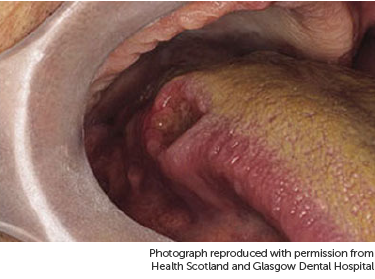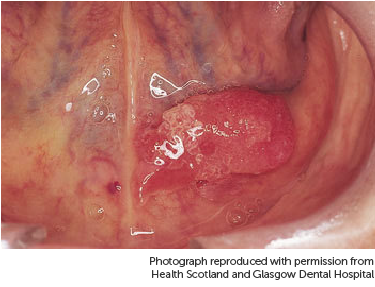Continuous Tongue Biting Can That Cause Cancer
What is tongue cancer?
Tongue cancer is a type of head and neck cancer. Cancer is when abnormal cells start to divide and grow in an uncontrolled way. Symptoms can include a spot or lump on your tongue that doesn't go away.
The main risk factors are smoking, drinking a lot of alcohol and infection with the human papilloma virus (HPV).
The tongue
There are two parts to your tongue:
- the oral tongue
- the base of the tongue
Cancer can develop in either part.
The oral tongue is the part you see when you poke your tongue out at someone. This is the front two thirds of your tongue. Cancers that develop in this part of the tongue come under a group of cancers called mouth (oral) cancer.

The base of the tongue is the back third of the tongue. This part is very near your throat (pharynx). Cancers that develop in this part are called oropharyngeal cancers (pronounced oar-o-farin-gee-al).

What are the types of tongue cancer?
The most common type of tongue cancer is squamous cell carcinoma (SCC). Squamous cells are the flat, skin like cells that cover the lining of the mouth, nose, larynx, thyroid and throat. Squamous cell carcinoma is the name for a cancer that starts in these cells.
What are the symptoms of tongue cancer?
The symptoms of tongue cancer might include:
- a red or white patch on the tongue that won't go away
- a sore throat that doesn't go away
- a sore spot (ulcer) or lump on the tongue that doesn't go away
- pain when swallowing
- numbness in the mouth that won't go away
- pain or burning feeling over the tongue
- problems moving your tongue or speaking
- a lump in the neck
- unexplained bleeding from the tongue (that's not caused by biting your tongue or another injury)
- pain in the ear (rare)
It's important to remember that these symptoms might be due to a less serious medical condition. But it's best to check symptoms with your GP just to make sure.
The photos below give you an idea of what tongue cancers can look like, but remember that they might appear differently from this. Contact your GP or dentist if you notice anything abnormal.
This picture shows cancer on the side of the tongue.

And below is a picture of a red patch underneath the tongue.

What are the risks and causes of tongue cancer?
We don't know the exact causes of most head and neck cancers, but several risk factors have been identified.
- smoking tobacco (cigarettes, cigars and pipes)
- regularly drinking a lot of alcohol
- infection with a virus called human papilloma virus (HPV)
(HPV) is a type of virus that infects the skin and cells lining the inside of the body. For most people, the infection will get better on its own and they will never know they had it.
This is a common virus that causes no harm in most people. But in some people, the virus can cause changes in the mouth and tongue that can increase the risk of cancer in that area.
Having a risk factors means that your risk is increased. But it does not mean that you will definitely develop cancer.
How do you test for tongue cancer?
Your doctor will examine you. They might look at the back of your throat using a small mirror that they put into your mouth. They will check for swollen lymph nodes in your neck.
A biopsy
The only way to confirm a diagnosis of cancer is to take a small amount of tissue (biopsy) from the abnormal area. A specialist doctor examines it under a microscope. They might test your cancer cells to check for HPV infection.
An examination under anaesthetic
You might have an examination and biopsy under a general anaesthetic. The doctor uses a tube and camera called a panendoscope to look into your throat.
A nasaoendoscopy
You might also have a nasoendoscopy (sometimes spelt nasendoscopy). You have this in the outpatient department of the hospital. During this procedure the doctor looks:
- inside your mouth
- at the back of the tongue and throat
- at the voice box (larynx)
Your doctor passes a flexible tube called a nasoendoscope through your nose. The tube has a camera and a bright light at the end so they can check for any abnormal looking areas.
It can be a bit uncomfortable, so your doctor may use an anaesthetic spray to numb your throat first. But if you have the anaesthetic spray you can't eat or drink until it wears off, so you may choose not to have it.
If the specialist sees an abnormal area, they will take a biopsy from that area. This is usually arranged for another time.
You will also have one or more of the following tests:
- MRI scan
- CT scan
- PET-CT scan
- blood tests
- dental check
- ultrasound scan
What are the stages of tongue cancer?
The stage of your cancer tells you how big it is and whether it has spread. It helps your doctor decide what treatment you need.
The stage of your cancer depends on:
- how far your cancer has grown into local tissues
- whether it has spread to nearby lymph glands
- whether it has spread to any other part of the body
Doctors use different staging systems. The staging system they use for you depends on where your cancer starts:
Tongue cancer that starts in the front two thirds of your tongue (oral tongue) is staged as a mouth cancer.
Tongue cancer that starts in the back third of your tongue ( base of your tongue) is staged as oropharyngeal cancer.
What is the treatment for tongue cancer?
The treatment for tongue cancer depends on:
- the stage of your cancer
- where the cancer is on your tongue
- your general health
chabrillanannothing.blogspot.com
Source: https://www.cancerresearchuk.org/about-cancer/mouth-cancer/stages-types-grades/tongue-cancer/about
0 Response to "Continuous Tongue Biting Can That Cause Cancer"
Post a Comment